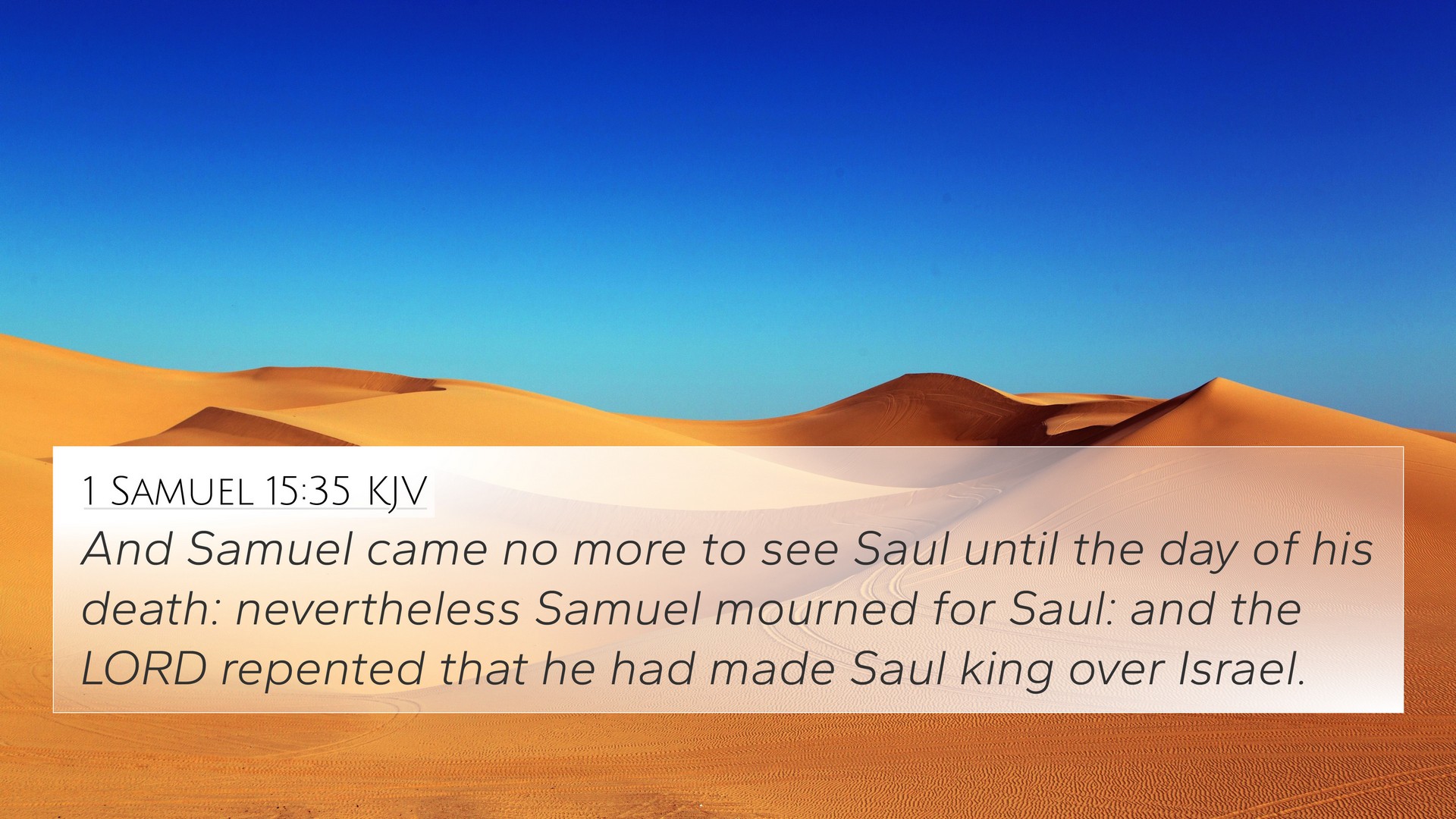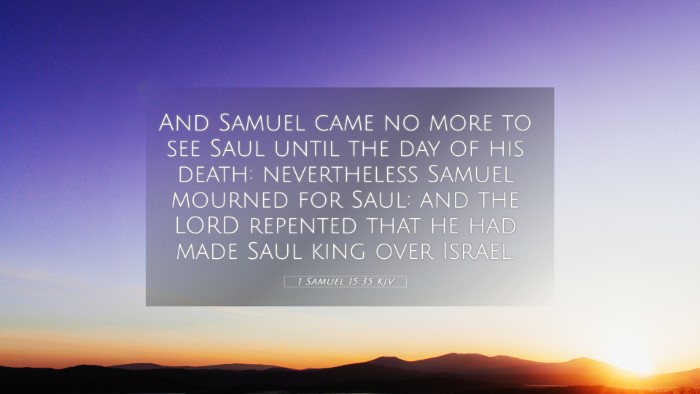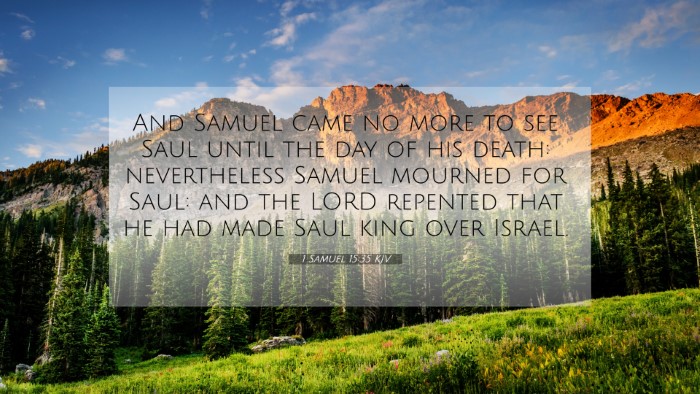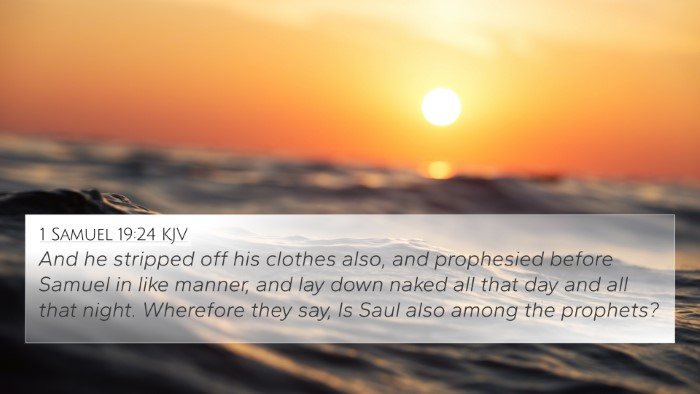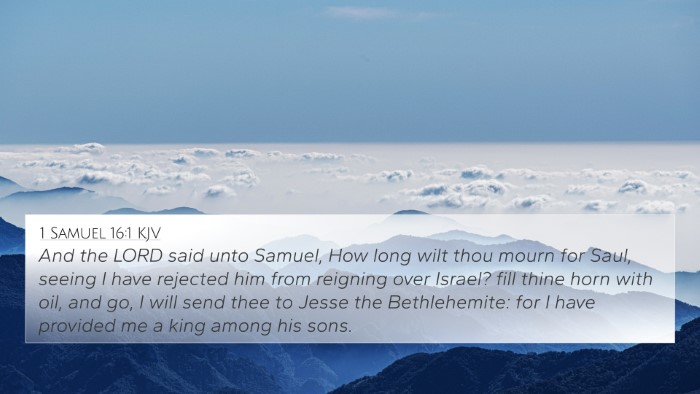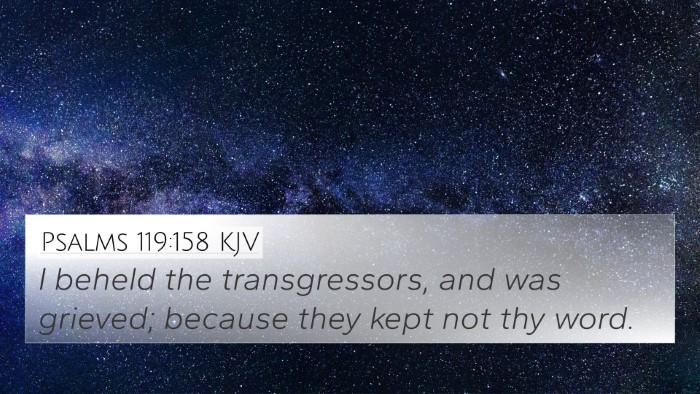Understanding 1 Samuel 15:35
This verse states:
"And Samuel came no more to see Saul until the day of his death: nevertheless Samuel mourned for Saul: and the LORD repented that he had made Saul king over Israel."
Interpretation Overview
1 Samuel 15:35 offers a profound insight into the relationship between God, His chosen leaders, and the consequences of disobedience. This moment between Samuel and Saul marks a turning point, underscoring themes of grief, divine disappointment, and the gravity of leadership in the divine plan.
Key Themes
- The Grief of Samuel: Samuel’s mourning for Saul illustrates the emotional toll of leadership decisions.
- The Repentance of God: The phrase "the LORD repented" indicates a divine sorrow over Saul's failure, highlighting God's relational nature with humanity.
- The End of an Era: Saul's rejection as king signals a shift towards David, emphasizing God's sovereign choice in leadership.
Commentary Insights
Drawing from the perspectives of various public domain commentaries:
-
Matthew Henry:
Henry notes that Samuel's grief stems from his prophetic role and personal connection to Saul. The text indicates that even divine selection does not guarantee righteousness, as seen in Saul's disobedience.
-
Albert Barnes:
Barnes emphasizes the idea of divine regret, suggesting that God’s “repentance” does not imply a change of mind, but rather a response to human actions. This term illustrates the seriousness of Saul's sin and its repercussions.
-
Adam Clarke:
Clarke discusses the implications of Samuel’s silence towards Saul, noting that it signifies God’s rejection. Samuel’s mourning reflects a prophet’s burden for the people of Israel and the leadership’s failure.
Bible Verse Cross-References
This verse relates to several other scriptural passages, contributing to a broader understanding of its themes:
- 1 Samuel 16:1: "And the LORD said unto Samuel, How long wilt thou mourn for Saul, seeing I have rejected him?"
- 1 Chronicles 10:13-14: "So Saul died for his transgression which he committed against the LORD."
- 1 Samuel 13:14: "But now thy kingdom shall not continue: the LORD hath sought him a man after his own heart."
- Jeremiah 15:1: "Then said the LORD unto me, Though Moses and Samuel stood before me, yet my mind could not be toward this people."
- Romans 11:29: "For the gifts and calling of God are without repentance."
- John 11:35: "Jesus wept," illustrating divine empathy.
- Lamentations 3:33: "For he doth not afflict willingly nor grieve the children of men."
- Micah 7:18: "Who is a God like unto thee, that pardoneth iniquity?"
- Psalm 51:17: "The sacrifices of God are a broken spirit: a broken and a contrite heart, O God, thou wilt not despise."
- 2 Timothy 2:19: "Nevertheless the foundation of God standeth sure, having this seal, The Lord knoweth them that are his."
Connecting Themes
The interconnectedness of these scriptures reveals deeper themes of repentance, divine judgment, and the nature of God's relationship with His chosen leaders. The emotional response from Samuel and the Lord reflects a profound understanding of accountability in leadership.
Conclusion
The narrative of 1 Samuel 15:35 serves as a somber reminder of the weight of leadership and the ramifications of disobedience. Through cross-referencing other biblical texts, readers can see these themes reiterated throughout the scriptures, emphasizing God's steadfastness in His covenant and the seriousness of His call on individuals' lives.
Further Study
For deeper exploration, consider utilizing tools for Bible cross-referencing and a Bible concordance to enrich your understanding of the relational dynamics illustrated in 1 Samuel 15:35 and its correlating passages.
